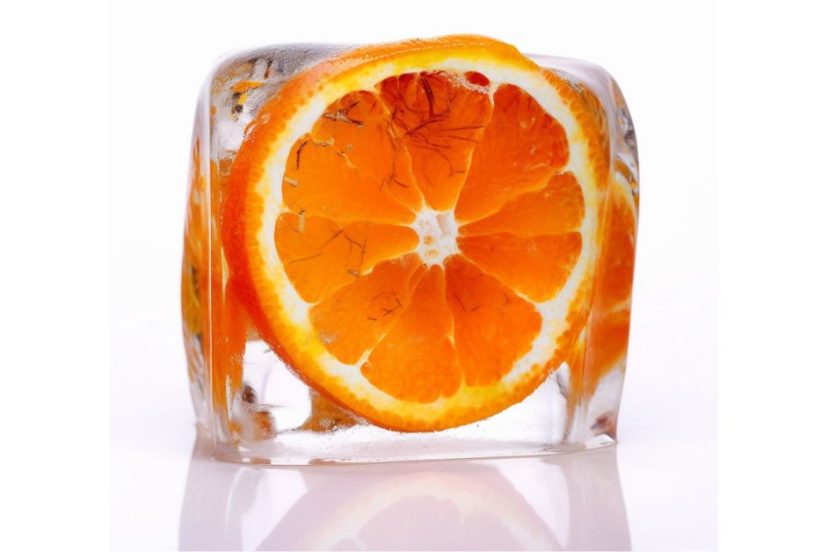Can You Freeze Orange Juice – Dos & Don’ts?
There are many questions surrounding orange juice, one common question I see out there is, can you freeze orange juice? In this article we will explore the good and not-so-good aspects of freezing orange juice. We will go over the benefits and things you might want to consider so you can make informed decisions about freezing orange juice and enjoy its goodness throughout the year.
The Freezing Process
When orange juice is exposed to low temperatures, the water content in the juice begins to freeze. The freezing point of orange juice is around 28 degrees Fahrenheit (-2 degrees Celsius). As the temperature drops below this point, ice crystals start to form. These ice crystals are made up of frozen water molecules and other dissolved substances present in the juice, such as sugars, acids, and vitamins.
Physical Changes
As orange juice free zes, its texture and appearance change. The liquid becomes thicker and syrupy due to the formation of ice crystals. The natural sugars in the juice also contribute to this thickening effect. Additionally, the cold temperatures can cause some separation between the water and pulp in the juice, resulting in a slightly altered consistency when thawed.
zes, its texture and appearance change. The liquid becomes thicker and syrupy due to the formation of ice crystals. The natural sugars in the juice also contribute to this thickening effect. Additionally, the cold temperatures can cause some separation between the water and pulp in the juice, resulting in a slightly altered consistency when thawed.
The Benefits of Freezing Orange Juice
Before delving into the details, let’s highlight the advantages of freezing orange juice:
- Retaining Nutritional Value: Freezing orange juice can help preserve its essential vitamins, minerals, and antioxidants, allowing you to enjoy a nutritious beverage even when fresh oranges are not readily available.
- Convenient Preservation: By freezing orange juice, you can store larger quantities and avoid waste, especially when you have an abundance of oranges during their peak season.
The Good: Advantages.
Now, let’s explore the good aspects of freezing orange juice:
- Extended Shelf Life: By freezing orange juice, you can significantly extend its shelf life. Properly stored frozen orange juice can remain in good condition for up to 12 months, allowing you to enjoy its tangy flavor even during off-seasons.
- Availability Year-Round: Freezing orange juice ensures a steady supply of citrus goodness regardless of the season. Whether it’s a refreshing glass of juice in the summer or a vitamin C boost during winter, having frozen orange juice on hand offers convenience and flexibility.
- Versatile Usage: Thawed orange juice can be used in various recipes beyond just a refreshing drink. You can incorporate it into smoothies, cocktails, marinades, salad dressings, or even use it as a flavorful base for homemade popsicles. The possibilities are endless.
The Not-So-Good: Considerations.
While freezing orange juice offers many benefits, there are a few considerations to keep in mind:
- Texture Changes: Freezing can affect the texture of orange juice. Upon thawing, you may notice slight changes in consistency, with some separation occurring between the juice and pulp. However, a quick stir or gentle shake can easily reincorporate the pulp, restoring the desired texture.
- Slight Flavor Variation: Freezing may cause subtle flavor changes in orange juice due to the natural oxidation process. While the difference is minimal, it’s worth noting that fresh-squeezed orange juice tends to have a slightly brighter and vibrant flavor compared to its frozen counterpart. Nonetheless, frozen orange juice still retains its delightful taste.
- Potential Nutrient Loss: Although freezing helps preserve the majority of nutrients in orange juice, some loss may occur during the freezing and thawing process. However, the nutrient content remains substantial, making frozen orange juice a valuable source of vitamins and minerals.
If you’re interested here’s an article on the effects of preservation on vitamin C.
How to Freeze Orange Juice Properly
To ensure the best results when freezing orange juice, follow these steps:
- Squeezing and Straining the Juice: Start by squeezing fresh oranges to extract the juice. Strain the juice to remove any pulp or seeds, ensuring a smooth consistency.
- Optional Addition of Citric Acid: Adding a small amount of citric acid can help preserve the flavor and color of the juice during freezing. Citric acid acts as a natural preservative and antioxidant. A teaspoon of citric acid per cup of orange juice is typically sufficient.
- Suitable Containers and Labeling: Transfer the freshly squeezed and strained orange juice into freezer-safe containers, leaving some headspace for expansion during freezing. Label each container with the date of freezing to keep track of its freshness.
Dos and Don’ts of Freezing Orange Juice
Consider the following dos and don’ts when freezing orange juice:
- Do use airtight containers: Opt for airtight containers that prevent air exposure and minimize the risk of freezer burn.
- Don’t freeze whole oranges: Freezing whole oranges is not recommended, as the texture and quality of the fruit may be compromised.
- Be cautious with carbonated juice: Avoid freezing carbonated orange juice, as the expansion of gasses during freezing can cause containers to burst.
Thawing and Using Frozen Orange Juice
When it’s time to enjoy the frozen orange juice, follow these thawing and usage recommendations:
- Refrigerator Thawing: Place the desired amount of frozen orange juice in the refrigerator and allow it to thaw slowly. Thawing in the refrigerator helps maintain the juice’s quality and prevents any temperature shock.
- Water Bath Thawing: If you need to thaw the juice more quickly, place the tightly sealed container in a water bath. Ensure the water is cold or at room temperature, not hot, to prevent cooking the juice inadvertently.
- Incorporating Thawed Orange Juice in Recipes: Thawed orange juice works wonderfully in smoothies, providing a tangy and refreshing twist. It can also be used as a flavorful ingredient in various recipes, adding a burst of citrus goodness to your culinary creations.
Conclusion
In conclusion, freezing orange juice offers several benefits for juice enthusiasts. It allows for extended storage, year-round availability, and versatile usage in various recipes. While there may be slight texture and flavor variations, the overall quality and nutritional value of frozen orange juice remain intact. By following the proper freezing and thawing techniques, you can enjoy the convenience of having orange juice readily available whenever you desire.
FAQs
Q1: Can I freeze other types of citrus juice, such as grapefruit or lemon juice?
- Yes, you can freeze other citrus juices like grapefruit or lemon juice following similar procedures mentioned in this article.
Q2: Is it possible to freeze orange juice with pulp?
- Certainly! If you prefer orange juice with pulp, you can freeze it without straining. Just ensure the pulp is evenly distributed in the containers before freezing.
Q3: Can I freeze orange juice concentrate?
- Yes, you can freeze orange juice concentrate. It’s advisable to transfer the concentrate into airtight containers or ice cube trays for easy portioning.
Q4: How long can I store frozen orange juice?
- Properly stored frozen orange juice can remain of good quality for up to 12 months. However, it’s best to consume it within 6 months for optimal flavor and nutrient retention.
Q5: Can I refreeze orange juice once it has been thawed?
- It’s generally not recommended to refreeze orange juice once it has been thawed. The quality may deteriorate, and there is an increased risk of bacterial growth. It’s best to thaw only the amount you need to avoid wastage.
Remember to always use your senses and judgment when assessing the quality of frozen orange juice. If it smells or tastes off, it’s advisable to discard it for safety reasons. Enjoy the convenience and taste of frozen orange juice while relishing the benefits it offers in your juicing journey.




